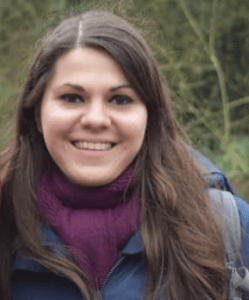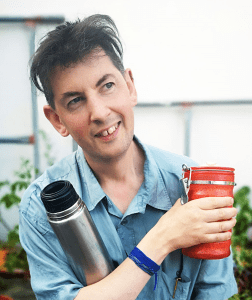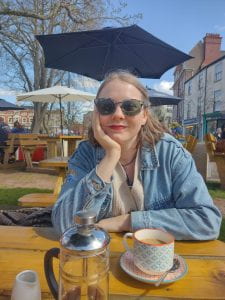The arrival on campus of Another Wave is Possible, the 90kg litter sculpture by eco-artist Wren Miller is a bold reminder of the harmful effect waste has on our environment. We can all take action and create change by making conscious, sustainable choices, however small they may seem – that’s why this September we’re encouraging you to Be the Change and challenge yourself to reduce the plastic you use to help wave goodbye to waste!
We spoke to a few of our colleagues who are already challenging themselves to reduce their waste, read on to find out more about their experiences.
Helen Fullagar, Projects Officer (Inclusion) HR
“We all know that our impact on the environment is causing incredible damage to the world and its balance, and I’ve never felt like humans should treat Earth as something they can use, rather, it is something we should work with and protect.
I try to choose loose fruit and vegetables where possible. I also grow a lot of my own fruit and veg in my allotment and garden. I’ve switched to a washable make-up remover cloth, instead of wipes, and reduced how much make-up I wear. I use a safety razor, instead of disposable plastic ones. I try to buy products in paper, card or glass rather than plastic. I also use shampoo and conditioner bars, bar soap and a solid deodorant. I’ve had one roll of cling film for about five years… and that came from someone else! I just use containers, or plates on top of things when microwaving, instead.
By making these changes I feel I’m living more to a lifestyle that matches my values. There’s also a bit more community feel; having an allotment, getting involved in litter picks in the area, and going to smaller, local stores (like my local zero-waste store) regularly.”
 Paddy Uglow, Digital Learning Materials Assistant Developer, Digital Education Office
Paddy Uglow, Digital Learning Materials Assistant Developer, Digital Education Office
“I want to reduce my waste to make the world a liveable place for a little longer than it would be otherwise. Also I think I’ve always felt a wrongness with unnecessary waste of all kinds – whether material, effort, energy, time…
I buy most of my dry goods in my own refillable containers. I reuse bath water to flush the toilet and have reduced toilet roll use. I use a heated blanket rather than heating the room. I grow more and store it in a freezer. I take any unusable plastic bags to the supermarket recycling point. I try to choose products with less single-use plastic and rarely buy any foods that come in single-use tins, cans or jars. Just recently I’ve managed to do nearly zero-waste camping; camping seems to generate so much waste, which really jars with being “in nature”. I have a 1.5L cold “bath” each day and rarely have hot baths or showers.
The biggest challenge for me is cutting back on ready meals and ingredients that come in single-use packaging, but batch-cooking with my partner is a fun alternative. And I like the staff at our nearest scoop shop, so trips there are enjoyable.
My tip to others is to be aware of anything single-use you use and see if there’s an alternative. Be suspicious of people suggesting you need to buy some kind of “green” product to be eco-friendly – do you really need a special reusable plastic cup? Just take along a normal cup, or even STOP at a café rather than dashing around with a cup of coffee!”
Gemma Windle, Systems Manager, Development and Alumni Relations Office 
“I think really hard about what I buy and whether there is a reasonable less wasteful alternative. The easy wins are refillable cleaning products and toiletries and reusing packaging (such as jars and resealable bags). The introduction of a ‘soft plastic’ recycling bin at my local supermarket also helps me reduce my impact.
Food is the biggest challenge. There is a zero-waste shop near me, but it’s price matched to Tesco, not Aldi/Lidl, it has very limited choice and limited opening hours. As much as I want to go plastic free, the zero-waste shop isn’t a realistic solution for me, so I end up buying a lot of food in plastic packaging and recycling it.
One thing I’ve noticed is I hardly ever have to take the bin out. And because my loo roll, cleaning products and toiletries all arrive by post it makes the weekly shop a lot easier to do on foot.
I wish the companies were made to be more responsible for the waste they produce. It shouldn’t be legal to create something with no thought for where it goes when it’s no longer useful.
It’s important to remember paper and cardboard has a carbon footprint too, so always opt for reusable where you can. It’s not just about plastic!”
 Dr. Sai Priya Munagala, Research Associate
Dr. Sai Priya Munagala, Research Associate
“Wherever possible, I have stopped buying things sold in single use plastic in favour of the loose produce – in the amounts that I need. For other purchases, I make sure to check if the plastic packaging is recyclable. I work in a laboratory set up and try to economise the consumables’ usage and actively encourage others to do so.
Despite the urge to reduce waste, a few things are impossible to get without generating waste. Sometimes, it gets really heavy on the pocket to practice the more sustainable way as shops charge quite a lot to buy packaging-free products.
It definitely involves extra effort and time, but I feel that maybe my bit would be helpful in making this planet a better place. People comment that ‘one individual’s changes are not going to affect anything’, to which I strongly disagree. If everyone argued against the comment, I’m sure that massive positive changes can be brought.”
Want to know more about the sustainable choices you can make to produce better outcomes for the environment? Read more on the Be the Change webpage.